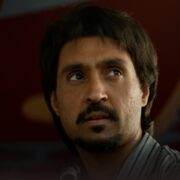Interview With Warwick Thornton, Director Of SWEET COUNTRY
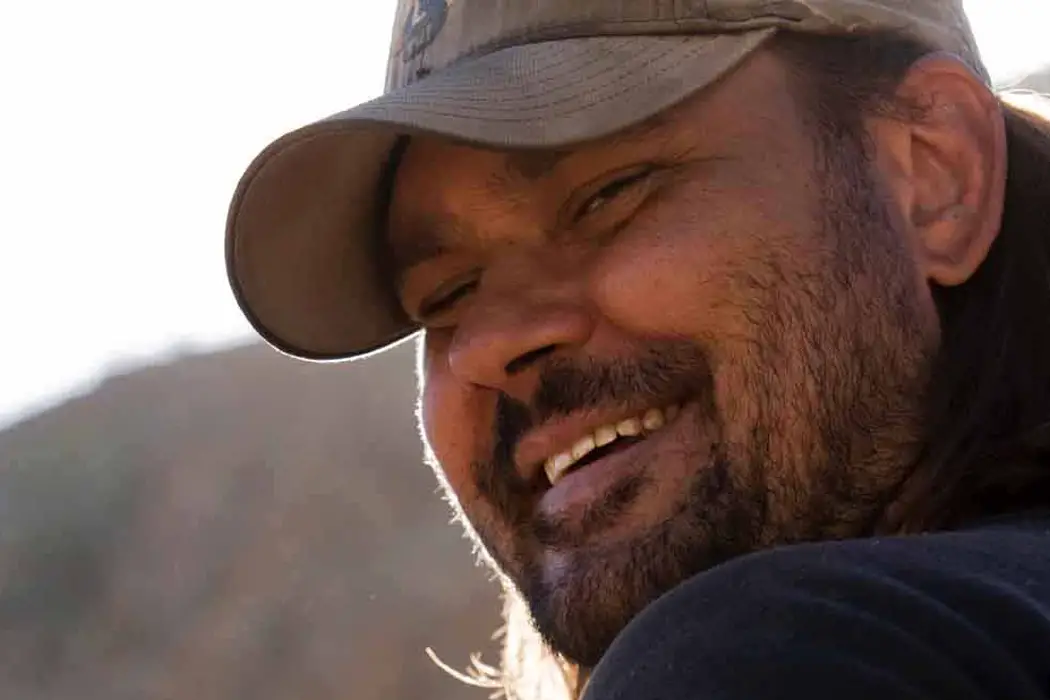
Alex is a 28 year-old West Australian who has a…
After its world premiere at the Venice Film Festival last year, Warwick Thornton’s second feature film Sweet Country was greeted with a 5 minute standing ovation, a wave of adulation that lead to it winning the Special Jury Prize. This was the first of many awards Sweet Country has won during its successful festival circuit, including the Platform Prize at the 2017 Toronto International Film Festival and the Audience Award at the Adelaide Film Festival. With an outpouring of positive reviews coming from all over the globe, Sweet Country has now finally come out in Australia, a timely release date of the day before Australia Day.
I managed to watch the movie at its Australian Premiere, which was hosted at the 2017 Adelaide Film Festival; my thoughts on it can be read here. I found Sweet Country to be one of the strongest Australian film releases I’ve seen in recent memory, an intelligent drama that filtered politically relevant themes through assured direction, spectacular cinematography and an innovative take on the traditional Western genre.
Inspired by a true story, Sweet Country transports us back to 1929 in a small rural town in the Northern Territory. From his first interaction with peaceful preacher Fred Smith (Sam Neill), it’s apparent that alcoholic war veteran Harry March (Ewen Leslie) is bound to cause trouble. March immediately takes advantage of Smith’s good nature, borrowing Smith’s indigenous farm hands Sam Kelly (played by newcomer Hamilton Morris, who gives a terrific performance) and young Philomac (played by twins Tremayne and Trevon Doolan), a favour that receives zero reciprocation.
When Philomac escapes from March’s violent clutches, March goes on a drunken rampage, leading him to confront the innocent Kelly (under the impression that he’s sheltering the kid), which forces Kelly to shoot him in a swift act of self-defence. Understanding the instantaneous judgement that he’ll face for being an Indigenous man who has just killed a white man, Kelly and his wife Lizzie (first-timer Natassia Gorey-Furber) go on the run. Demanding justice for the murder, Sergeant Fletcher (Bryan Brown) assembles a group of men to hunt down and arrest Kelly, whose knowledge of the outback rewards him with the upper hand against his potential captors.
In my interview with Warwick Thornton, we talked about the film’s thematic nature, how Sweet Country subverts American Western cinematic tropes, and the importance of knowing when to use a soundtrack.
Alex Lines for Film Inquiry: After touring at Venice, Toronto, Adelaide and just recently Sundance, I wanted to ask, what do you think of the festival circuit, and how was it this time with Sweet Country?
Warwick Thornton: I’m bit of a festival darling I guess (laughs). It’s necessary for our way of making movies, we don’t have 50 million dollars to create our own hysteria about how important we are, we can’t advertise on commercial television and very rarely do we have a billboard, so word of mouth is incredibly important for Australian films, especially low budget films. When they do well at festivals, and the word comes back, it creates a small media conversation and then suddenly you’re in papers, you’re online, so it’s incredibly important for small budget films.
These international festivals have definitely helped in raising the awareness of this film.
Warwick Thornton: Every f*cking film that’s Australian that doesn’t have a decent budget for print and advertising.
There’s a sad irony that Australian films have to receive international validation in order to have Australians watch them.
Warwick Thornton: Yeah totally, but that’s how this country works. I think the Canadians and the British have the same problem, you’re always kicking against the pricks.
Between all these different international locations, in your eyes, did you gauge different reactions from each place?
Warwick Thornton: Not really. They’re just as interested in other countries and what’s happening in their pasts and in their futures. So, it was pretty good.
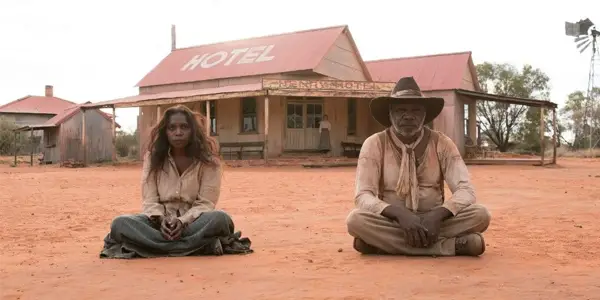
One of the strengths of your films is the strong sense of location. Sweet Country really captured the arresting nature of Outback Australia. How do you feel you achieve this?
Warwick Thornton: Get rid of the score. Get rid of the music and listen to the actual location and suddenly it becomes a much more stronger character. It’s universal that the score/music in a movie is slightly abused, used in key points to make you laugh or cry, so you can get rid of it. The sound of the city, the sound of the forest or desert becomes much more apparent, it becomes much more grounded.
With the lack of soundtrack, did you focus on building a greater soundscape?
Warwick Thornton: Yeah you have to. Your actors also have to act a bit harder too because they don’t have a score to hide behind.
Now the film had quite a timely release date in Australia, coming out the day before Australia Day.
Warwick Thornton: Yeah absolutely, it was done on purpose.
Interesting. In terms of the film’s thematic content, do you think this is a film that could’ve been made 5-10 years ago, and if so, do you think audiences would’ve reacted the same way?
Warwick Thornton: Dunno yet, we’ve just had the opening weekend, it’s done really well. It could’ve been made 5-10 years ago, but sadly it’s taken us till 2018 to tell a story like this, because this really should be a part of high school curriculum, but it’s not. We’ll talk about Ned Kelly in high school, but we won’t talk about Sam Kelly.
That’s the sad thing. You’ve got about 3-4 films about Ned Kelly already made.
Warwick Thornton: And there’s one coming out this year too.
That’s right, with Russell Crowe. I feel like if you made a film about a similar Aboriginal convict, that’d feel the need to demonise him rather than celebrate him like Ned Kelly.
Warwick Thornton: Yeah, well if Ned Kelly was alive today he’d be robbing 7-11’s, and you know what we think of those people. We call them ice heads.
Do you feel that because your film is set in 1929, that audiences have this natural barrier of “Hey, it sucked then but things are all great now”.
Warwick Thornton: Yeah, they can digest it a lot better. It’s different now, people just hide behind computers and pseudonyms now, in a strange way it has gotten worse.
Speaking of pasts, I noticed one of the heavy connections between all the major characters are that each of them is tortured by some form of trauma. We see Kelly and Lizzie’s unfold on-screen, then Harry March has his PTSD, Fletcher has his own demons. Would you say that this is speaking to the theme of Australia’s overall traumas, and Australia’s current lack of dealing with them?
Warwick Thornton: It could, it’s about shades of grey. People are dickheads, dickheads can be nice people, you know what I mean? We’re all evil in some way, we’re all good in some way. It’s trying to show those shades and give reasons for being and reasons for doing, that’s quite important for me. In classic Westerns you’ve got good guys, who wear a white hat and the bad guys who wear a black hat, and their morals never cross paths and that’s bullshit, humanity doesn’t work like that. It was important for me to be real with that.
It definitely helps in making the film not predictable. Bryan Brown never feels like a typical moustache twirling bad guy.
Warwick Thornton: Absolutely. We do love movies where Batman wins, but we buy a ticket knowing that Batman is going to win. He can be traumatised a bit, but in the last third he’ll rise and win. That’s cinema in a way, but that’s that kind of storytelling.
One of the most interesting subversions I really liked was the brief flashbacks/flashforwards throughout the film, giving hints at the fates/major details of each character presented. They reminded me of John Boorman’s Point Blank, one of my favourite movies from the 1970’s which used to emulate dream-like logic. Were these elements in the script, or did they come later in production?
Warwick Thornton: They weren’t in the script, we started building them day one of the shoot. Some of them are in the script because they’re flash-forwards to an actual scene that happens, so that’s in the script, so it was about shooting extras so I had more to play with, if I wanted to play with a scene earlier in the timeline. They’re about the fears of our future, the ideologies of our future, and the realities of our past.
Speaking on that, I’d say fear would be one of the major themes of the film.
Warwick Thornton: Yeah, it is, it’s fear of the frontier, the lawless frontier, the basic stuff from the Western genre.
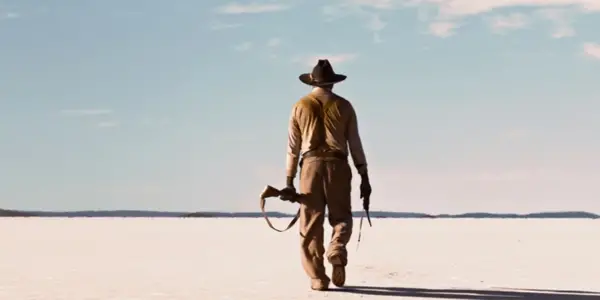
I’d say it’s one of the film’s biggest connections to today’s sociopolitical environment.
Warwick Thornton: Absolutely, the government’s creating certain forms of fear, to keep us all voting for them, because we’re afraid if we vote for someone else who we don’t know. You know, George Orwell wrote the book, 1984, about it.
The cinematography for this film is quite gorgeous.
Warwick Thornton: It’s all fun and games.
Did you storyboard or improvise when on location?
Warwick Thornton: Pretty much improvise. I grew up in Alice Springs, I was born there, so when I read the script, I knew the locations I wanted to shoot in. There was a logistical background to that, because I can’t shoot 200KM’s outside of Alice Springs, it just takes too much time to get out there, I’ll lose too many scenes due to travel. So you’d draw a circle around the hotel you were staying at, and say okay, we won’t shoot outside that circle. It was all there, I knew what I was going to shoot before we got to Alice Springs.
It was shot in the same location as Samson and Delilah correct?
Warwick Thornton: Yeah, pretty much.
Did you have any major visual influences for the aesthetic of this film?
Warwick Thornton: Yeah lots, but too many to list I guess. It wasn’t an American idea, it was more of a Spaghetti Western/Italian visual references, How The West Was Won, Once Upon A Time In the West, A Fistful of Dollars, The Trinity Brothers, the Bud Spencer and Terrence Hill movies, they are the ones I really enjoyed. I was never really into American Westerns, they were a bit too cut and dry, too black and white and Good and Evil. I like shades of grey and I like the good guys.
Yeah, Spaghetti Westerns always did a great job of visualising heat, the desolation of the outback and desert settings.
Warwick Thornton: Yeah, that and composition, close-ups and extreme wides.
The fact that this is a Western, do you feel that people are quite beholden to the need to shoot them on film?
Warwick Thornton: I gave up on that a long time ago, the whole romanticism of film. Film is a pain in the ass, I shot a lot of film, I shot in 35, it’s a pain in the ass. You’re only as good as what you’ve got the camera looking at, you can make digital look better than film. So I don’t deal with that anymore. It’s all about the lenses than it is about the actual recording device, whether it’s celluloid or data.
For me, it’s about the actual lenses you use, their characteristics and their attitudes, we used vintage Panamorphic lenses, they were really soft and gooey, they really sucked up a lot of the zeros and ones that come with data, that was more important to me to find the right lenses.
Were they quite hard to get a hold of?
Warwick Thornton: There was one set in Australia, and I needed two sets. Panavision looked around and they found another old set in LA so they were flown over for us.
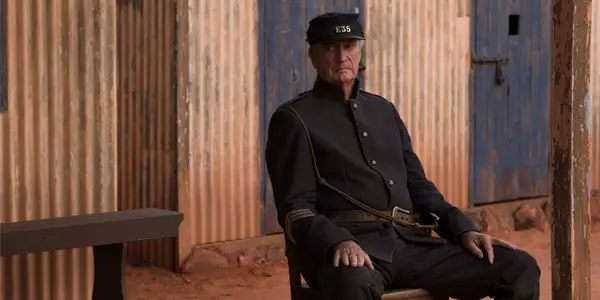
The story was based on the true story of David Trantor’s [sound recordist and friend of Warwick Thornton] grandfather. How factual to that original story would you say the final film ended up being?
Warwick Thornton: Not that much really. Never let the truth get in the way of a good story.
This film is quite a subversive Western. What were the major factors of the Western genre that you wanted to shift for this story?
Warwick Thornton: The music, the lack of music was a big one. I like barriers, I like to create problems for myself, because that makes creativity happen. If you have the money, you put a barrier in front of yourself, that you have to work around or get under, it creates a creative space and generally a financial problem. As soon as you take the music out, your atmospheres have to be a lot more empowering and important, they have to be chosen a lot better. Things just like that there, I’m one for a bit of pain in cinema.
I feel like it forces audiences to pay attention to performance.
Warwick Thornton: Absolutely, totally. It creates character, the desert, the landscapes. We can use wind, use crickets, the actual decibels things are at, the actual pitch that things are at, you can turn a cricket up to start screeching in your ear, like the violin in a Hitchc*ck film, you can play with these things more, be more creative.
Being your second film, especially after the standing ovation you got at the world premiere in Venice, was it quite a relief to see that audiences had clearly loved it?
Warwick Thornton: Yeah, it was actually.
After Samson and Delilah blew up, were you getting sent a lot of scripts or were you wanting to write your own again?
Warwick Thornton: Yeah, I got offered a lot of agents in LA, I said no, I’ve got my own stuff to do, I’m not really interested in LA and that kind of stuff. There were scripts that were sent around, but I wasn’t interested in reading them.
When I interviewed Sophie Hyde in Adelaide for the web-series she was premiering there, her first film was 52 Tuesdays, and I asked her that same question, and she told me that she was offered a lot of coming-of-age stories, it feels like the industry tries to pigeonhole filmmakers into specific genres and styles. Did you feel this was happening to you?
Warwick Thornton: No, not really. I am an Indigenous filmmaker, so the stuff that I’m sent usually has indigenous characters. But then hey, Avatar is an indigenous film, but I didn’t get sent Avatar (laughs).
Film Inquiry thanks Warwick Thornton for taking the time to talk with us.
Sweet Country is out now theatrically via Transmission Films in Australia. Sweet Country is coming out via Samuel Goldwyn Films to American Cinemas on the 16th of March.
Does content like this matter to you?
Become a Member and support film journalism. Unlock access to all of Film Inquiry`s great articles. Join a community of like-minded readers who are passionate about cinema - get access to our private members Network, give back to independent filmmakers, and more.


